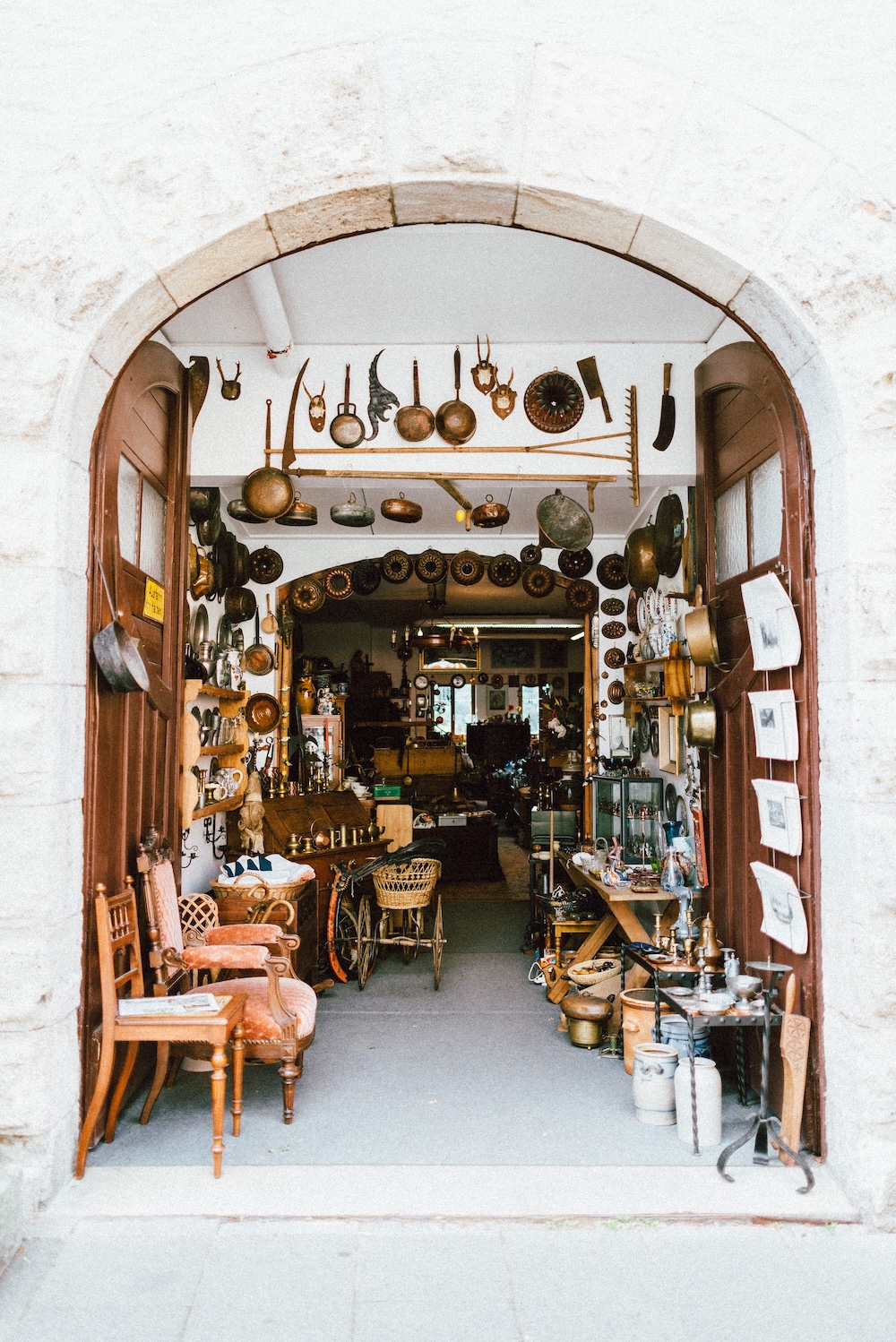
(Image: Julien-Pier Belanger/Unsplash)
More than 90 percent of Americans say they'd be open to receiving a secondhand gift for the holidays, yet only 34 percent plan to shop secondhand for others, according to 2022 polling from Morning Consult and the online secondhand retailer Poshmark.
There's clearly a disconnect here: Most of us would be happy to receive something that's gently used, but we worry giving a thrifted gift will somehow leave our loved ones feeling less special. If you still have a few more names to check off your gifting list before the weekend, consider breaking the cycle and choosing a secondhand option for your last-minute shopping.
Is it ethical to shop secondhand if you can afford retail prices?
The holiday season is a time of giving and gratitude, but it also comes with a hefty side of overconsumption that can be difficult for those in the sustainability space to reconcile. At the same time, a prevailing moral question hangs over secondhand shopping: If I can afford to pay full price for something but buy it at a thrift store, am I hurting my neighbors with lower incomes? Should I have left this deal for someone else?
It makes logical sense to assume the rising popularity of thrift stores would mean fewer options for people in the community who rely on secondhand shops to get what they need within their budgets. But practically speaking, it's not that black and white.
Thrift stores across the U.S. are overwhelmed by the volume of donations they receive. Items that can't be resold are down-cycled (think: old clothing used for rags and insulation) or shipped to other countries, where they compete with local businesses and pile up in landfills.
Many smaller thrift stores have little choice but to throw unsold items away. Just ask Paul, brother of 3p contributor Riya Anne Polcastro, who salvages items from an independent charity thrift store dumpster in Oregon and finds a variety of things that still have plenty of use left. “I do see a lot of kitchen supplies — you know, plates, cups," he told us earlier this year. "I see a lot of artwork, like paintings that go on the wall. A lot of toys, like kids’ toys. So many kids’ toys!”
It's impossible to say whether someone else would have purchased that item you bought secondhand, or whether it would have gone to waste, but conscientiousness and common sense are generally a solid guide. While social media influencers selling their thrift store finds online for profit will likely prompt continued debate, thrifting something you or a loved one will enjoy and use is far better than that thing going to waste while you buy an equivalent that's brand new. In other words: Don't clean their shelves off, but unless your local secondhand stores are struggling with low inventory, we say thrift away.
Last-minute secondhand shopping: The many ways to buy used
That having been established, what does it mean to shop secondhand for the holidays, and what can we expect to find? While clothing is the first thing that comes to mind for many, it's only the tip of the iceberg in terms of the usable goods flooding thrift store shelves. Here are some of our favorite items to thrift for gifts and all year round!
Kitchenware. As someone who loves playing around in the kitchen, I've caved to the social media ads and purchased the flashy new pot set or gadget of the season more than once. And I can tell you that the majority of the time, it's not worth it. The tried and true staples like cast iron and stainless steel often still work best and, if cared for properly, can last a lifetime. Even pans that look too far gone to save can often be revived — check out this guidance on breathing new life back into rusted cast iron or discolored stainless steel.
But don't limit yourself to basics like pots and pans when you shop secondhand. Niche but helpful tools like graters, ricers and hand juicers, as well as small appliances, bakeware and dishware are common finds at local thrift stores. While some stores sell items as-is, they should be able to confirm if electric appliances are in working order, and many let you test them out yourself.

Books. It's difficult to pin down exactly how many books are thrown away, but one widely cited 2012 study puts the estimate at around 320 million annually in the U.S. alone. While many have converted to digital readers or audio books, some still prefer the real thing — and with so many readable books in need of a second home, there's little reason not to buy used for this commonly gifted item. Along with your local thrift store, search out used booksellers in your area — which are often stocked with disused books from libraries and tend to carry a better selection.
Tools. Much like kitchenware, common hand tools like hammers, screwdrivers, wrenches and awls can last for decades, but there are many reasons someone may part ways with them. They're bulky, heavy and can pile up, so carting them on long moves often doesn't seem worth the hassle. That means thrift stores across the country are stocked with basic home improvement items that are perfect for a loved one who just moved into a new apartment or just can't stop tinkering around the house. If they're looking a little rusty, that's easily remedied with common household items like sandpaper, vinegar or baking soda.
While it may take a bit more digging, electric tools are also a fairly common thrift store find. As with kitchen appliances, confirm the tools are in working order or, if not, what is wrong with them. Items like cordless drills, for example, may simply have a burned-out or missing battery that can easily be replaced.
Games and toys. Like Paul said, "So many kids' toys!" While the vast majority are safe and usable, you do want to exercise caution when you shop secondhand for children. In the U.S., thrift stores and secondhand sellers are bound by regulations from the Consumer Product Safety Commission in the same way as other retailers, but sometimes things can slip through the cracks.
Guidance like this from Wisconsin's Department of Agriculture, Trade, and Consumer Protection can help you choose toys that are both fun and safe. Generally speaking, it's best to avoid vintage painted wood toys that may carry risk of lead, and do a quick search on Recalls.gov before purchasing to ensure the toy has not been recalled for safety issues.
Video games. While gamers are all about that new release, most still enjoy the classics. And why pay full price for a nostalgic '90s game when you can shop secondhand and give an old one a new life? Many mainstream retailers like GameStop and Best Buy sell pre-owned games alongside new ones, but you'll also find a well-stocked video game section in most local thrift shops. If you're not a gamer yourself, just be sure you're choosing games for the right console system (a Sony game won't work in an Xbox console, for example, and vice versa).
Sporting and exercise equipment. From hockey sticks to backyard soccer nets and everything in between, sporting and exercise equipment is ideal to shop secondhand. These items were built to take a beating, and as long as they're free of cracks and other visible damage, they'll play just the same for most athletes. Along with your local thrift store, pre-owned sporting goods stores are fairly commonplace in larger towns and cities across the U.S., and many sell exercise equipment like free weights alongside sporting gear.
Jewelry. Sourcing precious metals and stones often comes with hidden costs, from human rights issues to environmental damage. Along with choosing ethical sellers with transparent sourcing policies when you buy new, choosing to shop secondhand for jewelry can help you avoid supporting these harmful systems while still walking away with something pretty. Even pieces showing signs of tarnish can be restored to their original brilliance with a few simple steps and common household materials.

Art and home decor. If you saw a piece of art and thought of someone, it means the same whether it's new or used. And since common decor items like art pieces, mirrors, vases and knick-knacks are rarely handled, they typically show little sign of wear and tear while bringing more personality to your loved one's pad than some mass-produced item from a big-box store. Shop secondhand to save these pieces from the landfill.
Fabrics. Looking for an eco-friendly alternative to wrapping paper? We don't blame you. Many wrapping papers aren't recyclable, and estimates for annual wrapping paper waste sent to landfills range in the millions of pounds.
Sure, you can wrap your gifts in newspaper — the "Sunday funnies" wrapping has been a grandma standby for decades for a reason. Plain butcher or craft paper are also great options that are recyclable curbside with other papers. But if you're looking for a wrapping solution that's truly zero-waste, fabric is the way to go.
Based on the Japanese tradition of furoshiki, fabric wrapping is growing in popularity, with a variety of simple folding techniques to choose from. Any piece of fabric that's large enough for your gift will work, meaning there's no reason to run out and buy something that's marketed as "fabric gift wrap" when your local thrift store is bursting with disused fabrics that can do the same job. Along with choices for your holiday wrapping, the fabric section of your local thrift store — or even those racks of clothes and discarded linens — is perfect for those who like to craft at home.
(Featured homepage image: Allison Christine/Unsplash)

Mary has reported on sustainability and social impact for over a decade and now serves as executive editor of TriplePundit. She is also the general manager of TriplePundit's Brand Studio, which has worked with dozens of organizations on sustainability storytelling, and VP of content for TriplePundit's parent company 3BL.














